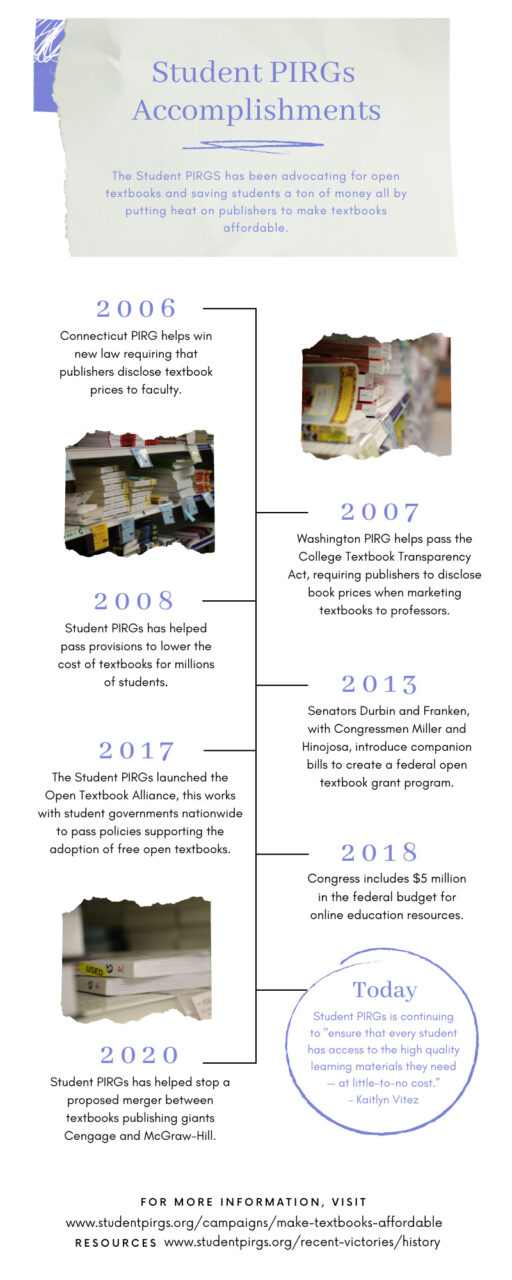
Multiple groups are taking action to try to protect students from overpriced textbooks.
An organization called Student PIRGs (public interest research group) claims in their Faculty Statement of Support that the cost of course materials has increased 88% over the past decade — three times the rate of inflation.
The group is part of Open Textbook Alliance, a nationwide project of the Student PIRGs “uniting student leaders who are working to bring open textbooks to college campuses and protect students in the textbook market.” Their website says their focus is to “fix the broken textbook marketplace.”
Open Textbook Alliance’s research found nearly 65% of students have skipped buying a book at some point because of cost and 10% of students have skipped meals because of course expenses.
The Student PIRGs’ textbook campaign webpage says they have “led the way exposing textbook publisher’s practices that rip off students.” The group champions cost-saving textbook options like used books, rental programs and advocating for open textbooks as a long-term solution. They have chapters and clubs at campuses across the nation but BYU does not participate.
Open textbooks are course materials made available for students to freely use. The difference from traditional textbooks is they are published under an open copyright license, which allows educators to modify textbooks in a way that would better help their classes understand. Students have access to these open textbooks with no extra cost.
Matthew Manly, an exercise science major at BYU, said he thinks textbook prices are inflated because students have no option but to purchase them. “Their price far exceeds what an average book of that size would cost,” he said.

Katelynn Gilbert, the North Carolina PIRG campaign coordinator for textbook affordability, said she focuses on educating local professors about open education resources. She is working on a pledge that professors will be encouraged to sign promising they will take textbook affordability into consideration when designing their courses.
“We sent out hundreds of emails to undergraduate professors to let them know that they could sign our pledge,” Gilbert said.
According to Gilbert, about 250–300 professors have pledged to do so.
Dan Xie, political director of Student PIRGs, said a major issue is a lot of professors aren’t aware of their open textbook options.
“You’ll get the data from 2010 and 2011, and there are only a couple percentage points of professors who had even heard of open textbooks. Over the years we’ve educated literally thousands of professors about their options,” Xie said.
Professors who participate in open education resources can go in to their digital textbook and write in the definition they prefer. Gilbert and Xie said they believe schools should encourage open textbook usage.
“The industry needs to be honest about how much these auto-billing contracts exploit students and universities. Forty-two percent of institutions signed contracts that put limitations on publicity around these partnerships,” Xie said. “If they’re so good for students why would you ban campuses from actually talking about them?”
Xie suggested to ensure transparency from textbook publishers, students and professors should make sure their school is not considering an auto-billing contract.
The Open Textbook Alliance program said they focus on protecting students in the textbook market by taking action against price-raising textbook practices. This saves students money they could put toward other expenses.
“The prices bother me because I am already paying a large amount of money for my education and it seems silly that there are essentially hidden fees on top of what I’m already paying,” Manly said. “As a college student who is paying their own tuition, the money that has to be spent on textbooks would be better used on food, rent plus utilities and other necessities.”
The Student PIRGs website encourages students to reach out to their professors about open textbooks and advises professors to take a look through their assigned textbooks and ask themselves how necessary they will actually be.
People who want to take action can visit Open Textbook Alliance’s take action page.




